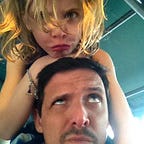Tim Piatek’s Odyssey
In November of 2006, Neuqua held one of its most unusual concerts in its hallowed auditorium. The evening was a largely improvised affair, bringing together two inspirations that had perhaps never been wedded before or since: the poetry of Langston Hughes and stories from The Odyssey.
At the center of the stage sat the evening’s architect and master of ceremonies, Tim Piatek. Stationed behind his keyboard, Tim invited up one freshman after another, laying down blues riffs while his students took turns reciting, rapping, and singing the blues. Some students adapted the sufferings of Odysseus, others sang of their own misfortunes. Tim’s delight was obvious and infectious; he shifted keys to match each voice, laughing and inciting the crowd to applaud the amateur vocalists.
It was a cold night outside the auditorium, but the house band was cooking, and I remember thinking that only Tim Piatek could bring together so many people for such an eclectic event. A lover of Greek mythology and the Harlem Renaissance, Tim relished exploring the echoes of the West’s oldest poetry in the distinctly American form. But more importantly, Tim loved bringing teenagers into the art, to coax ordinary 14-year-olds onstage and unify suburban troubles with a standard blues progression and tales of the legendary Greek mariner. One of the truths Neuqua stands for is that music belongs to everyone, but so rarely does anyone outside of the Music Department center this lesson in their teaching. Tim could do that, though — he could make the shy kid brave, the quiet kid roar, even the measured co-worker wail. We all took a turn that night on Tim’s stage, and I can’t imagine Homeric poetry has since been more alive.
Tim’s gifts weren’t limited to spectacle. One day in February I lost my temper with a kid. We were both in the wrong, but only one of us had an unfinished teenage brain, and I came into the English office smarting and hot. Tim listened while I recounted how I allowed a disagreement to escalate, until neither the student nor I had any recourse but public confrontation. “I played it all wrong,” I said. “I wish I got to do it again.”
“You do,” Tim said. “Tomorrow.” He showed how a teacher apologizes, reframes, and resets a relationship. In his wisdom and generosity, I found the grace to accept responsibility. Teachers are notoriously human; Tim modeled that as a feature, not a bug. The best humans make mistakes, take ownership, do better, and make the whole process a teachable moment.
And that really is how we all thought of him: one of the best humans. I hadn’t spoken with him in years, but I thought of him often — his boundless passion, dauntless optimism, distinctive laugh. He was a champion of insecure colleagues, a friend to sullen adolescents, an unabashed dork for volleyball, cheesy love songs, and professional wrestling. He had a bloodhound’s zeal for sniffing out the joy English, so much so that even his comma lessons crackled like a George Carlin set. His enthusiasm was such that he could put a bearhug into a simple handshake or make a dry curriculum meeting feel like a Saturday night at CBGB. Tim’s attentiveness made everyone he spoke to feel important, and he was so genuine in his friendship that you couldn’t help but like yourself better because Tim liked you first. It surprised no one at Neuqua that he became so successful a department chair because he was so obviously called to inspire the best from people, and he so unfailingly fulfilled this purpose.
It is crushing to think that Tim Piatek is not out there today, that his keyboard is silent. So much has been taken these past few years, and it seems with each tragedy that someone irreplaceable has been lost. A sky without stars is an unnavigable black space. But good teachers don’t really die; their legacy is seeded in the memories of students and parents, colleagues and administrators. And Tim was one of the best.
All over the state today, there’s a song of hard times and sorrow. It’s multiplied through an endless reverberation of choirs of people who knew a good man and mourn his passing. A chord progression aching with the sad insistence of memory, echoing the weariness of a storm-tossed wanderer longing for the shores of Ithaca. It’s unbearable, yet somehow humming together eases the burden. Tim Piatek taught us how to sing the blues.
